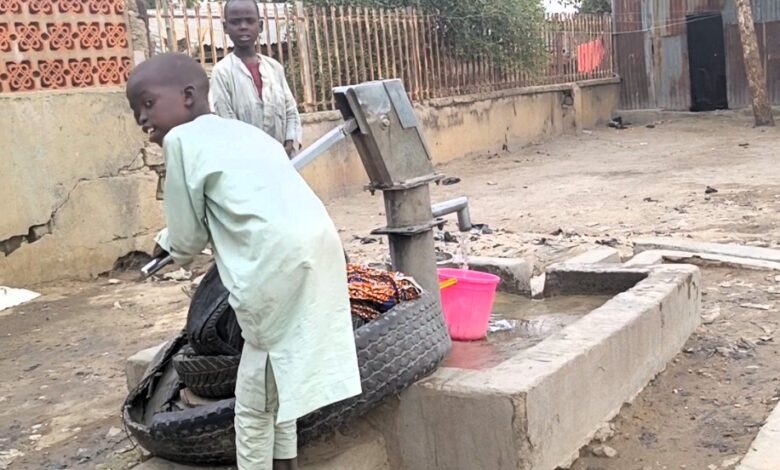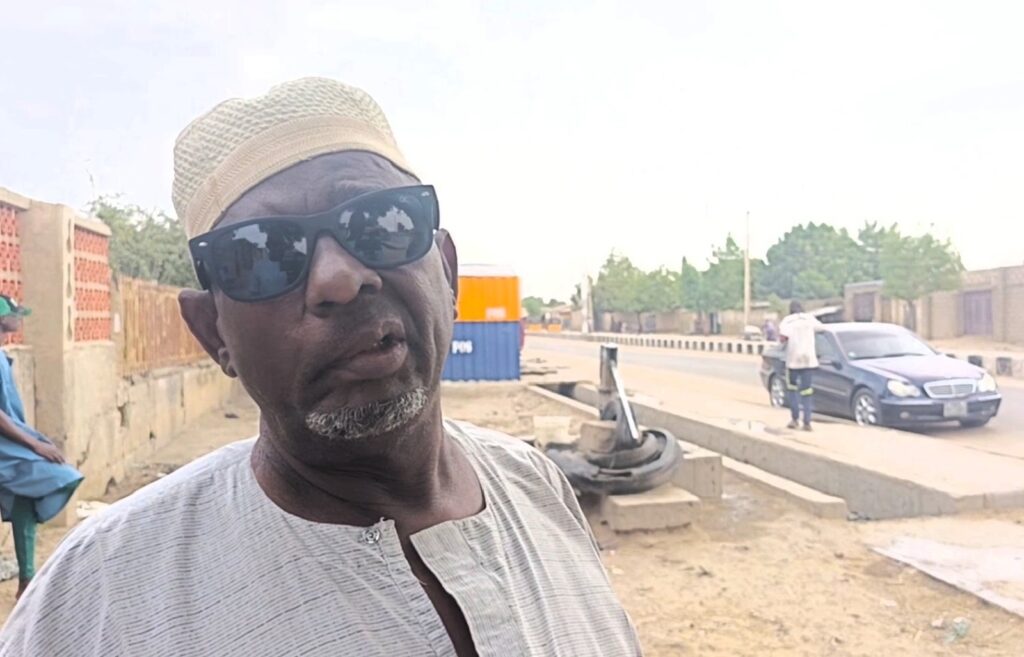The Toxic Taps Of Old Maiduguri
Residents of this community in northeastern Nigeria face health risks due to contaminated water sources.

There are many things wrong with the water in Shuwari II suburb of Old Maiduguri, Borno State, North East Nigeria.
For one, “the water does not only corrode our wares, but it also does not foam to lather when we bathe or wash,” said Deeja, an internally displaced person who lives in the area.
“It is bitter, and when you taste it, you know something is wrong,” she added.
Deeja is one of the residents of this community who recently voiced their fears about the water. The water they draw from local boreholes brings more than just relief from thirst; it brings disease and despair.
Talking about the impact of using the contaminated water on her household, another resident, Maryam Abubakar, who is an IDP from Dikwa, said pots containing the water overnight started to show signs of corrosion the next morning. “Imagine what it does to our stomachs. My children sometimes complain of stomach ache after drinking the water,” she added.

Since fleeing their communities due to the Boko Haram attacks about nine years ago, Deeja and Maryam have resided in Jere, Borno state’s food production hub. This area is now plagued by a crisis. The government-installed boreholes, originally intended to provide clean drinking water and improve sanitation, are instead spewing contaminated and corrosive water. This alarming issue has put the community in peril, facing the irony that their primary water source, designed to support life, is now endangering it.
The residents said they have attempted to find solutions. The cost of buying clean water from vendors is crippling under the weight of an economy that has not been kind to their pockets.
“We have about 11 submersible hand-pump boreholes in my community here in Shuwari II, but only three of them are dispensing water that we cannot drink,” said Jidda Yunus, the bulama (community leader).
“Initially, we were not aware of the problems until people started complaining about them some years ago. I had to go and personally fetch some water from the borehole in the morning and I noticed that it had some brownish particles in it. When I left it for some time, it began to corrode the container. That was when I knew we had a problem.”
Bulama Jidda said most of the boreholes manifesting such problems are the ones provided to the community by politicians as constituency projects.

He said the community leadership had to advise residents to avoid drinking the water for safety purposes. They were advised to buy from vendors who fetch water from cleaner and safer boreholes far away from their homes.
“The state government recently installed a solar-powered borehole that delivers cleaner water. Unfortunately, thieves stole the solar panels because we couldn’t afford to pay the security guard who was meant to protect the facility.
“Sometimes, we cannot afford to buy from the vendors, so we have no option but to drink from unclean water. What else can we do?” he said.
The lack of access to clean drinking water has greatly affected Deeja’s limited finances.
“Our husbands are unable to farm due to insecurity in the area, so they take on menial jobs that barely generate any income,” she said. “We can only make ends meet by braiding our neighbours’ hair for very little pay. To make matters worse, when we return home, we have to use the little money we earn to purchase safe water from vendors.”
According to her, a 20-litre jar of water goes for ₦50, and to buy a whole pushcart for the family costs ₦600. “Who can afford that?”

The community reached out to authorities for help, but their efforts were met with silence.
“We don’t even know who to talk to,” the bulama said. “Someone suggested we form a cooperative and register with the CAC, but that ended in us being defrauded.”
Rahman Malam-Mohammed, an elder in the community, expressed his concern about the potential health risks associated with using the water. “It’s not just one or two boreholes; many of them here in this neighbourhood are sources of life-threatening water. We fear for our lives. The prevalence of renal diseases and kidney failures in our community is alarming, and we can’t help but wonder if the water we drink is to blame.”
Just across the street, children fetched water from one of the toxic hand-pumped boreholes and carried it home, likely running errands for their mothers.
“Even if we adults can avoid drinking this water, how can we prevent these children from taking a sip or two while fetching from that borehole?” Malam-Mohammed asked in a concerned tone.

According to another senior resident, Zanna Mohammed Ajunima, the problems of unclean water started before he moved into the neighbourhood.
“I moved 13 years ago, and I encountered this problem. There hasn’t been a solution. So many people from the University of Maiduguri and even the Water Board came here to fetch samples from the boreholes for laboratory tests and they declared that it is not good for human consumption. Yet that’s what people are drinking. Sometimes people complain of diarrhoea or malaria, and maybe it is due to the water.”
Ajunima, a retired civil servant from the Lake Chad Research Institute, suggested that the issue might not be related to the construction of the boreholes.
“In terms of the water table, we have different layers called aquifers where water is stored underground,” he said. “Many of the boreholes in this area are shallow, tapping only into the first aquifer. This is why we are experiencing these challenges.”
When HumAngle contacted the Borno state-owned Rural Water and Sanitation Agency (RUWASA), the General Manager, Engineer Mohammed Aliyu, although unaware of the situation in Old Maiduguri, was not particularly surprised. His agency had previously dealt with similar cases involving poorly constructed boreholes.
“We will deploy our engineers to visit the locations, inspect the situation, and provide a solution,” he promised. “We shall also test the water to ensure its safety for consumption.”
The water engineers at RUWASA said shallow boreholes could be dangerous, explaining that elevated levels of metals like iron, manganese, arsenic, and lead can be harmful over time, so it’s crucial to test the water to ensure its safety.
The Borno State government had in 2020 established a fund to support research aimed at combating the high rates of renal failure and kidney diseases. The government wanted researchers to look into the causes of these diseases, with a focus on investigating water quality and environmental factors.
“We need more than just promises and tests; we need solutions, and we need them fast,” pleaded Baba Gana, an elder in the community.
“As long as we reside here, our lives, our children’s futures, depend on this water. If it’s killing us slowly, what future do we have? People are dying, and we can’t help but wonder if the water is to blame. How many more must suffer before something is done? We need a better source of water beyond these hand pumps.”
Support Our Journalism
There are millions of ordinary people affected by conflict in Africa whose stories are missing in the mainstream media. HumAngle is determined to tell those challenging and under-reported stories, hoping that the people impacted by these conflicts will find the safety and security they deserve.
To ensure that we continue to provide public service coverage, we have a small favour to ask you. We want you to be part of our journalistic endeavour by contributing a token to us.
Your donation will further promote a robust, free, and independent media.
Donate HereStay Closer To The Stories That Matter




